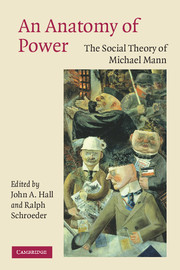Book contents
- Frontmatter
- Contents
- List of figures
- List of contributors
- 1 Introduction: the IEMP model and its critics
- Part I Theory, practice, method
- Part II Types of power
- Part III European exceptionalism?
- Part IV Promise and perils of modernity
- Part V Response
- 16 The sources of social power revisited: a response to criticism
- Bibliography of Michael Mann's Writings
- Index
- References
16 - The sources of social power revisited: a response to criticism
Published online by Cambridge University Press: 22 September 2009
- Frontmatter
- Contents
- List of figures
- List of contributors
- 1 Introduction: the IEMP model and its critics
- Part I Theory, practice, method
- Part II Types of power
- Part III European exceptionalism?
- Part IV Promise and perils of modernity
- Part V Response
- 16 The sources of social power revisited: a response to criticism
- Bibliography of Michael Mann's Writings
- Index
- References
Summary
I feel honoured by this volume and indebted to the contributors for their praise and their criticism. Having long avoided reflecting on my methodology, I thank Joseph Bryant for revealing it to me and then defending it. Randall Collins gives an incisive account of the substance of my model of the four sources of social power (ideological, economic, military and political) and its location amid other sociological theories. As he says, my power sources are distinct in not being abstract but embodied in real networks of people. These have emergent properties giving them some causal autonomy, though they do not amount to ‘logics of development’, since they are also closely entwined. I do not focus on power resources held by individuals – unlike Bourdieu's model of economic, cultural, political and social forms of power. I focus on differences between the four networks, unlike most forms of ‘network theory’ (e.g. mathematical modelling or Castells’‘network society’). The closest parallel, as Collins observes, is with the new economic sociology emphasizing networks of economic connection. As he says, the same job could be done on ideological, military and political power. I also retain my distinctions between ‘collective’ and ‘distributive’, ‘intensive’ and ‘extensive’, ‘diffuse’ and ‘authoritative’, and ‘infrastructural’ and ‘despotic’ power, and I use them below.
I reject sociology's foundational notion of ‘society’ because the boundaries of the four power sources rarely coincide.
- Type
- Chapter
- Information
- An Anatomy of PowerThe Social Theory of Michael Mann, pp. 343 - 396Publisher: Cambridge University PressPrint publication year: 2006
References
- 25
- Cited by



